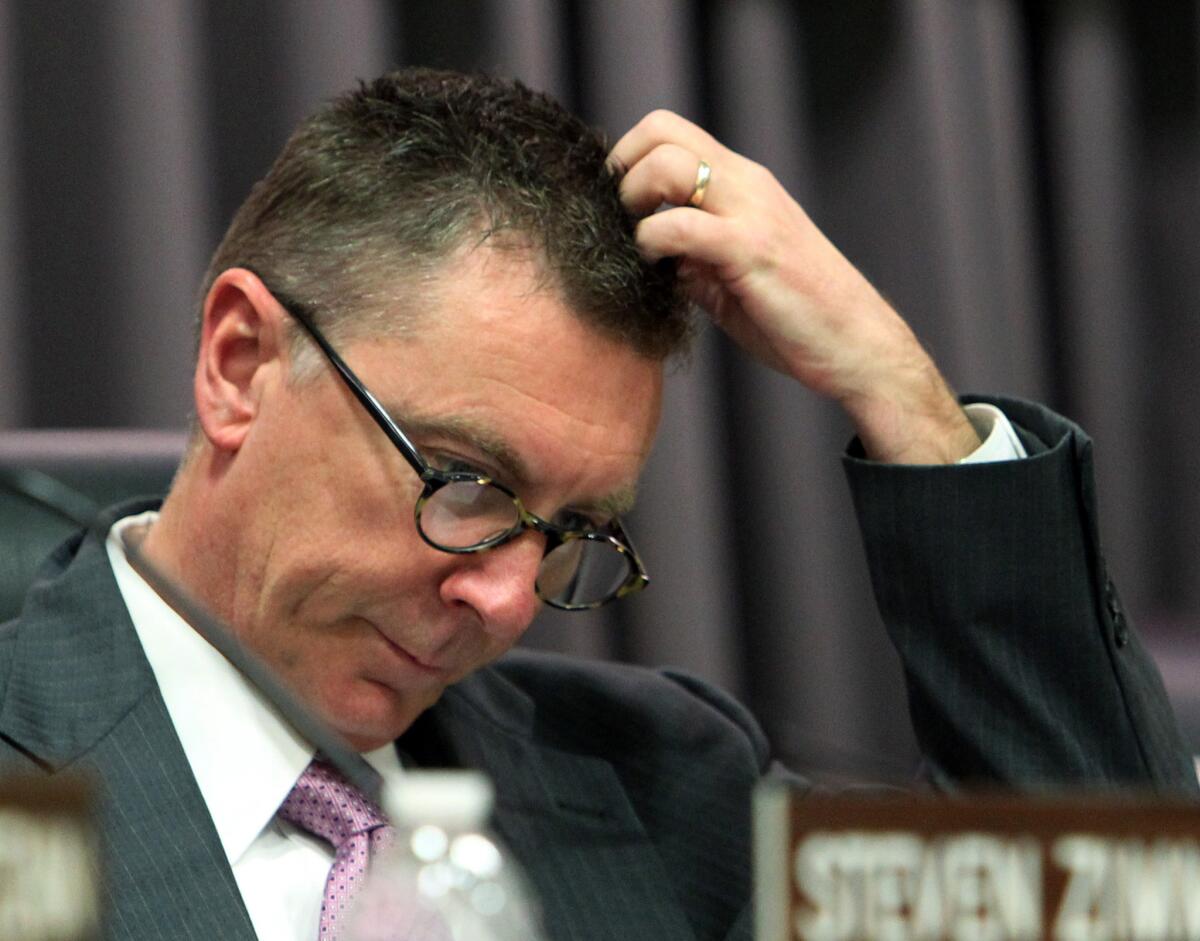Can Supt. Deasy survive LAUSD’s iPad fiasco?

- Share via
So, remember that $1-billion plan to get iPads for each and every Los Angeles Unified student the district has been working on and steadfastly defending for a couple of years now?
Forget about it. The deal is off, creating a new round of L.A. Unified chaos just as another school year begins.
The announcement came just days after the release of emails detailing Supt. John Deasy’s cozy contacts with Apple and curriculum software manufacturer Pearson before they were awarded large contracts.
Deasy, who has denied any improprieties, actually tried to put a positive spin on the long-running fiasco when he announced that the deal with Apple was kaput. The decision, he said in a memo to school board members Monday night, will “enable us to take advantage of an ever-changing marketplace and technology advances.… We will incorporate the lessons learned from the original procurement process….”
You’d think all had gone according to plan, but make no mistake:
Despite the upbeat, moving-on tone of that message, the Deasy pullback is a defining moment in his tenure. It was nothing short of a forced surrender to critics who have argued for months that Deasy charged ahead on the iPad project as if he knew best and everyone else’s job was to get out of the way.
And what did that get us? A commitment to spend tens of millions of dollars on pricey tablets and on software programs that hadn’t even been developed.
And the iPad fiasco is not the only problem bearing down on Deasy.
He’s got a newly radicalized teachers union calling for his scalp in the middle of contract negotiations. The two sides are miles apart on a range of issues, including salaries, teacher evaluations and the ever-rancorous philosophical divide over the corporate and nonprofit influences on public education.
He’s potentially lost his reliable majority on the school board with the election of George McKenna to an open seat.
He’s got the possibility of a new round of investigations into the Apple/Pearson deals by the L.A. Unified inspector general because of the emails.
And the school district, which years ago ditched a disastrous $120-million computerized student tracking system, is now trying to figure out how to fix persistent problems with the new $20-million system that replaced it. Early glitches have sent some parents and teachers into a tizzy over ridiculously large class sizes and misplaced transcripts, among other mishaps, and Jefferson High students staged a sit-in.
But getting back to iPads, Deasy’s white-flag moment follows not only the email release, but also comes in the wake of a damning report on the bidding process by an L.A. Unified technology committee. A draft, obtained last week by my colleague Howard Blume, covered what critics have been telling me and others for more than a year — that the rules of the bidding process appeared to benefit Apple and Pearson, and that there was at least an appearance of a conflict of interest on the district’s part.
And the emails really make you want to hold your nose.
“I believe we would have to make sure that your bid is the lowest one,” now-departed Deasy deputy Jaime Aquino wrote to Pearson in May 2012, two years before the contract was approved.
Aquino, if you have forgotten, had been an executive with a Pearson affiliate prior to heading up Deasy’s tech implementation plan.
Deasy — who graciously appeared in a promotional video for iPads before the contracts were awarded — later jumped in on that same email conversation.
“Understand your points and we need to work together on this quickly,” wrote Deasy, later adding he did not want to lose “an amazing opportunity.”
Deasy maintains that the emails were not about the larger, $1-billion tech plan but about “a pilot program we did at several schools months before we decided to do a large-scale implementation.”
Even if you believe that, along with Deasy’s claim that “nothing was done in any inappropriate way whatsoever,” his contact with Apple and Pearson raises countless questions about whether a legitimate bidding process was ever an objective.
“You should make every bidder think they have a slim chance of getting the job,” said Stuart Magruder, the school bond oversight committee member who briefly lost his post for asking too many questions about all of this. Deasy “didn’t do that. He created an environment where Apple and Pearson probably didn’t have to be as creative as they could have been.”
Or as thrifty. As Magruder noted, the district agreed to a far higher cost per device than what other districts were paying. Magruder also argued that he believes the main objective with digital devices has always been to facilitate more test-taking rather than better teaching and deeper, more meaningful learning experiences for students.
“There are all of these adults fighting among themselves and doing nothing to actually get the kids educated,” Magruder said. “And so many skirmishes between us seem to drive more skirmishes.”
So here we are, back to square one after a couple of wasted years, with Deasy calling for the process to begin all over again. It’s almost as if now he’s in a hurry to make everyone forget the past.
But it remains to be seen whether the superintendent, having lost a great deal of credibility, can survive the political fallout and learn enough from his blunders to lead the way more capably.
“I think that John Deasy lives by the sword and suffers by the sword of urgency,” L.A. Unified board member Steve Zimmer said. “I wouldn’t want him to not be urgent, and not be impatient, but sometimes there’s a cost to that.”
More to Read
Sign up for Essential California
The most important California stories and recommendations in your inbox every morning.
You may occasionally receive promotional content from the Los Angeles Times.














